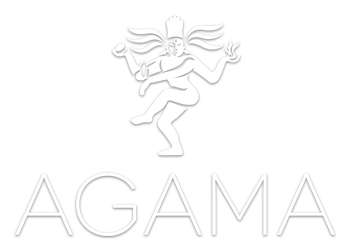Criteria for Certification
The following Criteria for Certification must be met by all students wishing to become Agama Yoga teachers. If during the Teacher Training Course any staff member becomes aware of any breach of these criteria, ATTC Administration will be notified, and will investigate and address the matter promptly, in a case-appropriate manner. We reserve the right to deny certification to any student who does not fulfill course obligations or who does not meet Agama Yoga standards, as detailed below. In the event that certification is withheld, it will be at the sole and final discretion of Swami Vivekananda to grant permission to retake the course.
Attendance
With the exception of emergencies, Agama Yoga expects full attendance of all ATTC sessions in order to earn the certificate issued at the end of the course, pending the successful outcome of a student’s exams. A student will be granted a small margin of excused absenteeism from class sessions (5 percent or less) to account for illness, visa runs, or emergencies. Attendance is defined as active participation in all facets of the program: theoretical presentation, asana practice, meditation, interviews, teaching workshops, etc. A student who does not meet the attendance minimum will not receive his or her teaching certificate. If a student’s excessive absence is due to a legitimate reason, such as an illness or other health emergency, he or she may join a future ATTC at a cost of 25 percent of the course, and must successfully attend all classes and pass all exams (with the same margin of absenteeism as noted above, for the same acceptable reasons) in order to earn the course certificate. Otherwise, should certification be withheld due to unexcused absences, the student may – upon approval of a new application to the program – attend the ATTC again at a future date for the full program fee in order to receive certification.
It will be the student’s responsibility to make up any missed course material for excused absences.
The first month of the ATTC serves as a semi-trial period, during which all ATTC participants will be evaluated with emphasis given to their levels of enthusiasm, dedication, and aspiration. At the end of this period, individual meetings will be held between each ATTC student and Swami Vivekananda. A decision will be made at this point as to whether or not students have demonstrated the necessary qualities to successfully complete the ATTC. A detailed account of Agama's expectations for students is found in the Criteria for Certification and Terms of Agreement. An evaluation will be made such that if Agama Yoga decides after the first month that a student is not fit to become a teacher in this tradition, the ATTC Administration will refund two-thirds of the tuition fees (minus deposit). No refunds will be given after this point in the program.
Students may not attend any other Agama Yoga course levels, workshops, or retreats concurrently while enrolled in the Agama Teacher Training Course.
Exams
Three examinations mark a student’s progress through the course. The first two contain written questions taken from lecture theory and supplemental course materials. The final exam, in conjunction with a final evaluation of the student, must be completed successfully. The final exam consists of a written section covering teachings and theory specific to the ATTC as well as a practical component in which students must demonstrate asanas, pranayama, and other techniques with satisfactory competency. Participants must complete the course with a cumulative passing average on exams, in addition to attendance verification, in order to receive their teaching certification.
Practicum Workshop Training
Successful completion of all practicum teaching assignments is a requirement for certification. Presentations must demonstrate a student’s ability to teach using the Agama Yoga methodology, including a good command of the scripted mnemonics as well as theoretical absorption of the material itself demonstrated by a proper understanding of the course material, correct answers to questions when student-teaching, etc.
Professional and Ethical Behavior
After certification, an Agama Yoga teacher is expected to adhere to certain standards, which will be described fully in the Spiritual Code that you will be required to sign at the end of the course. If there is found to be a professional or ethical complaint against an Agama teacher, an inquiry will be made. If a legitimate basis for the complaint is found, it could result in revocation of certification, or other limitations placed on the teacher’s use of the name “Agama Yoga.”
Annual Empowerment
Agama Yoga teachers teach under the permission and spiritual protection of the founder and spiritual leader of the school, Swami Vivekananda Saraswati. At the end of each ATTC, graduates receive an empowerment to teach directly from Swami Vivekananda. In order to continue teaching under the Agama name and with the protection of Swami Vivekananda, you must receive an empowerment each year. This brief meditation is arranged at least twice annually, scheduled a minimum of three weeks in advance. Teachers worldwide are asked to synchronize their schedules with this announced meditation and to participate in order to renew their empowerment.
Use of the Name “Agama Yoga”
Use of the name Agama Yoga and the Logo are restricted by international trade mark only to be used in compliance with Agama Yoga terms and conditions. We encourage ATTC participants, upon graduation, to register themselves as an Active Agama Yoga Teacher and ambassador this esoteric yoga throughout the world.

